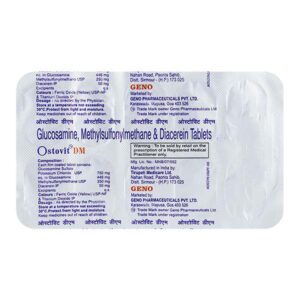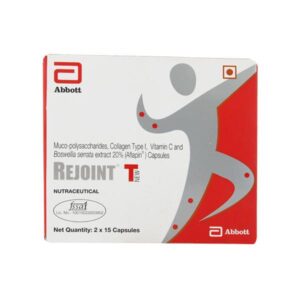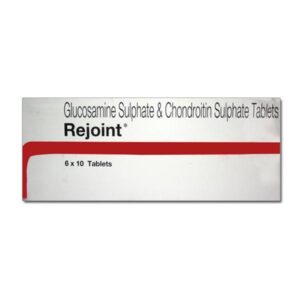CHONDROITIN + GLUCOSAMINE
Chondroitin: Chondroitin is a dietary supplement that is commonly used for the treatment of joint pain and osteoarthritis. It is a naturally occurring substance that is found in the cartilage of the joints.
The mechanism of action of chondroitin is not completely understood, but it is believed to work by inhibiting the enzymes that break down cartilage in the joints and reducing inflammation. It may also help to stimulate the production of new cartilage.
The recommended dose of chondroitin varies depending on the specific product and formulation. It is typically taken orally in the form of capsules or tablets. The usual dose ranges from 800 to 1200 mg per day, divided into two or three doses.
Chondroitin is generally considered safe and well-tolerated when taken at the recommended doses. However, some people may experience mild side effects such as nausea, diarrhea, constipation, and stomach discomfort. Allergic reactions to chondroitin are rare but can occur. It is always advisable to consult with a healthcare professional before starting any new supplement or medication.
Glucosamine: Glucosamine is a dietary supplement that is commonly used to treat osteoarthritis and joint pain. It is a naturally occurring compound in the body, specifically in the fluid around joints. Glucosamine supplements are typically derived from the shells of shellfish.
The primary use of glucosamine is to alleviate the symptoms of osteoarthritis, a degenerative joint disease that affects the cartilage in the joints. It is believed that glucosamine helps to rebuild and repair damaged cartilage and reduce inflammation in the joints.
The exact mechanism of action of glucosamine is not fully understood. It is believed that when taken as a supplement, glucosamine provides the body with the necessary building blocks to produce and repair cartilage. It may also have anti-inflammatory effects, which can help reduce pain and swelling in the joints.
The typical recommended dose of glucosamine is 1,500 mg to 2,000 mg per day, taken orally in divided doses. It is important to note that the effectiveness of glucosamine may take several weeks to months to become apparent. It is advisable to consult with a healthcare professional for specific dosing instructions tailored to individual needs.
While glucosamine is generally considered safe for most individuals, there are some potential side effects to be aware of. Common side effects may include nausea, diarrhea, constipation, indigestion, and heartburn. These side effects are generally mild and temporary. Some individuals may also experience allergic reactions, such as rash or hives, although this is rare.
Glucosamine may interact with certain medications, such as blood thinners, so it is important to inform your healthcare provider of any other medications you are taking before starting glucosamine supplementation. Additionally, glucosamine should be used with caution in individuals with diabetes, as it may affect blood sugar levels.
Overall, glucosamine is a popular supplement used to manage joint pain and osteoarthritis. It is important to consult with a healthcare professional before starting any new medication or supplement to ensure it is appropriate for your specific needs and to discuss potential side effects or interactions.




